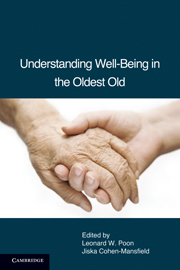Book contents
- Frontmatter
- Contents
- List of Tables
- List of Contributors
- Foreword by Carol D. Ryff
- PART I THEORY: NEW HORIZONS IN WELL-BEING RESEARCH
- PART II PARADISE LOST: BETWEEN TRAUMA AND HAPPINESS
- PART III PATHWAYS AND GATEKEEPERS: MODERATING, MEDIATING, AND PROXIMAL PROCESSES
- PART IV SIGNPOSTING PARADISE: MEASUREMENT OF WELL-BEING
- Index
Foreword by Carol D. Ryff
Published online by Cambridge University Press: 05 August 2012
- Frontmatter
- Contents
- List of Tables
- List of Contributors
- Foreword by Carol D. Ryff
- PART I THEORY: NEW HORIZONS IN WELL-BEING RESEARCH
- PART II PARADISE LOST: BETWEEN TRAUMA AND HAPPINESS
- PART III PATHWAYS AND GATEKEEPERS: MODERATING, MEDIATING, AND PROXIMAL PROCESSES
- PART IV SIGNPOSTING PARADISE: MEASUREMENT OF WELL-BEING
- Index
Summary
To grapple with the meaning of well-being is to seek understanding of the human condition when the glass is nearly full. Not surprisingly, this rich and challenging issue has engaged philosophers for more than 2,000 years. In our contemporary era, well-being has become a prominent focus of research that spans the scientific disciplines – it has become empirically tractable. Well-being is now studied with the same fervor once restricted to obviously objective facts, such as rates of death and disease. The field of aging was surprisingly prescient in recognizing the importance of well-being from the outset. Classic studies in social gerontology dating back to the middle of the past century were fundamentally concerned with understanding old age not simply as a process of decline and deterioration but as an experience of meaningful inner evaluations and satisfactions. These initial ideas have been extensively elaborated in subsequent decades, and entire literatures of aging and well-being have now been assembled.
This book carries the study of well-being into important new territory. By focusing on the oldest old, that historically unprecedented stretch of living, the authors address some of the most fascinating questions imaginable: Is well-being possible at the very end? For whom? What is the shape and form of positive experience when life is nearly over and the future has been swallowed by the past?
- Type
- Chapter
- Information
- Understanding Well-Being in the Oldest Old , pp. xv - xviPublisher: Cambridge University PressPrint publication year: 2011



